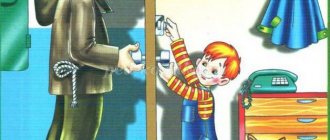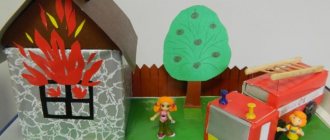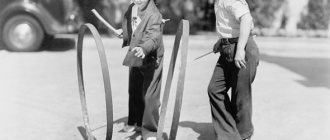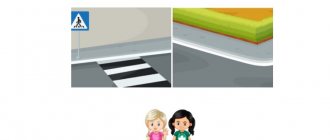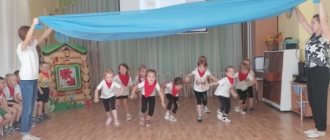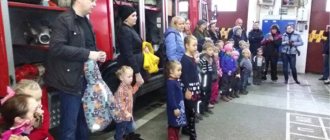Life safety reminder for children and parents
MBOU Prokhorovskaya secondary school
Reminder for students and parents on safety precautions
at the beginning of the academic year 2022 – 2022 academic year
Dear parents!
I would like to draw your attention to the adoption of additional measures to ensure the safety and health of children. Remember that during the autumn holidays you are personally responsible for the safety of your child!
Do not leave children unattended near a body of water.
- Do not allow children to play in places that pose a threat to life and health: in landfills, vacant lots and abandoned buildings, next to the road, etc.
- Don't forget to remind your children about the rules of the road:
- Walk on the side of the road or street towards traffic.
- Do not cross the road in front of nearby vehicles!
- When you hear the noise of approaching traffic, look back and let it pass.
- Do not go out onto the road in areas of limited visibility from the driver and pedestrian.
- Keep young children close to you in traffic areas.
- Riding a bicycle on roads and streets is permitted from the age of 14. You can only ride a bicycle or roller skate in the yard or on the sports ground.
- Games on the roadway are strictly prohibited.
To prevent a tragedy, follow the rules of conduct when in the area of railway transport:
- Cross railway tracks only in designated places at pedestrian crossings, bridges and tunnels.
- When crossing railroad tracks, make sure there are no approaching trains and follow the light and sound signals.
- Do not use headphones or mobile phones when crossing railway tracks.
- Do not climb onto the roofs of cars, supports and special structures of contact networks, overhead power lines and artificial structures.
- Do not crawl under railway rolling stock or climb over automatic couplers.
- Do not place foreign objects on railroad tracks.
- Don't walk on railroad tracks.
- Do not run on platforms or jump from them onto the train tracks.
- Do not approach the carriage until the train has completely stopped.
- It is prohibited to light fires in the village and forest areas;
- Keep medications away from children.
- Be careful when contacting electrical appliances, follow safety precautions when turning on and off the TV, electric iron, kettle, etc.
- When collecting mushrooms and berries, take special care, avoiding collecting unknown and poisonous plants.
- Follow the rules for using household appliances.
- Due to the aggravation of the crime situation, be especially vigilant when in contact with strangers, be especially careful in crowded places.
- Observe safety precautions when using gas appliances;
- Observe the time mode when watching TV and working on the computer;
- Be careful when handling pets;
When going outdoors, keep in mind that
- when bathing children during hikes, walks and excursions in the summer, choose a quiet, shallow place with a gently sloping bottom that is clear of snags, algae and silt;
- children should not be allowed near bodies of water without adult supervision;
- A bathing child should be continuously monitored;
- while swimming, prohibit children from jumping into the water and diving from the railing or from the shore;
- resolutely stop children's pranks on the water.
- It is prohibited to be on the street without an adult after 23.00. I remind you that you bear administrative responsibility for violating the Regional Law of December 16, 2009 No. 346-Z “On measures to prevent harm to the health of children, their physical, intellectual, mental, spiritual and moral development.”
- Teach children:
- When at home, do not open the door to strangers.
- If unfamiliar adults try to take you away by force, resist, scream, call for help.
- Don't go anywhere with strangers and don't get in the car with them.
- Do not agree to any proposals from unknown adults.
electrical safety
If you have small children, cover all sockets with special caps to ensure their safety; Keep children away from electrical appliances.
- Systematically warn children about the danger of electric shock and prohibit them from climbing power poles, entering transformer substations or technical basements of residential buildings where wires and communications are located. As a rule, special warning signs or corresponding posters are posted in these places. All these signs and posters warn people about the danger of electric shock, and it is not permissible to ignore them, much less remove them.
- Remind children that they should not throw wires or other objects onto the wires, break insulators, or open staircase electrical panels and input panels located in the entrances of houses.
- Teach your children the dangers of electric shock. Operating electrical installations are not a place for games and entertainment.
Electrical safety in case of fire
Remind children of fire safety rules when using household electrical appliances!
- Do not use faulty electric heating devices! Do not place switched on electrical appliances close to wooden structures, curtains or other objects made of flammable materials.
- Do not allow several powerful electricity consumers to be connected to the power grid at the same time. They can overload the network and cause a short circuit.
DO NOT FORGET! A SHORT CIRCUIT IN THE ELECTRICAL WIRING CAUSES A FIRE.
- Water and electrical wires do not mix! This is a very important rule! You cannot cover the wiring with wallpaper, hang it on nails (they are metal!), pull the wiring out of the walls, tie it in knots, or use it as a clothesline. All this leads to insulation failure and short circuit of electrical wires.
- It is DANGEROUS to use old connecting cords and extension cords, especially those with visible insulation defects.
- It is dangerous to use faulty switches, sockets, plugs, or to connect their bare ends to the electrical network without special plugs by twisting wires. This will cause the wires to heat up greatly, and their insulation from high temperatures may lose its properties.
A serious danger is the use of non-standard, homemade fuses (bugs). The electrical network is fully protected from short circuits only by standard fuses.
On New Year's holidays, you cannot decorate the tree with fabric and plastic toys, or cover the stand and tree with cotton wool. The Christmas tree should be lit only with industrial-made electric garlands. It is not allowed to light sparklers, use firecrackers or wax candles indoors.
Safety rules when handling animals
.
-You should not look the dog directly in the eyes. This provokes the animal to attack.
-You should never show your fear or anxiety to an animal. The dog may sense this and become extremely aggressive.
-Under no circumstances should you run away from a dog. By doing this you provoke the dog to attack.
-You should not feed other people's dogs, much less touch them while eating or sleeping.
-Do not approach guard dogs. Some of them are trained to rush at people approaching at close range.
-Do not make sudden movements when handling the dog or the dog's owner. The animal may think that you are a threat.
-Do not touch puppies if their mother is nearby, do not take away what the dog is playing with.
-If in a narrow place, for example in an entrance, a dog comes towards you on a leash, it is better to stop and let its owner pass.
-Animals can spread diseases such as shingles, rabies, plague, typhus and other infectious diseases.
Safe cycling.
For safe cycling on streets with traffic
The following rules must be observed:
— Riding a bicycle on streets and roads is allowed for children at least 14 years old.
— Use a bicycle that is appropriate for the child’s height.
— Do not transport objects that interfere with the control of the bicycle.
— You can’t ride a bike together, without a bell and with a faulty brake.
— You should not drive with nearby traffic or cling to passing traffic.
Remind children to follow these rules:
* when leaving home, they always informed where they were going and how they could be contacted if necessary;
* avoided casual acquaintances and invitations to unfamiliar companies;
* informed by phone when they were returning home;
Keep track of who your child communicates with and where he goes.
Make sure that your child does not use dubious literature and video products. Limit and control your child’s online communication.
Maintain a trusting and friendly relationship with your children. Don't intimidate your child with punishments.
IF YOU ARE BITTE BY A TICK:
CAREFULLY, WITHOUT CRUSHING, GRAB THE TICK WITH YOUR THUMB AND FOREFINGER, EASILY TURN RIGHT, LEFT, AND THEN PULL IT OUT.
It is advisable to remove ticks while wearing medical gloves.
The tick must be delivered to a medical facility in a closed jar.
Treat the wound with iodine. For 14 days, try not to catch a cold and measure your temperature.
If the temperature rises, consult a doctor immediately!
REMINDER
for parents
on the prevention of the new coronavirus infection COVID-19
To protect their child, parents need to know the methods of transmission of coronavirus, the main symptoms of the disease, as well as measures to prevent coronavirus infection.
Methods of transmission of coronavirus infection
- by airborne droplets (when coughing, sneezing, talking);
- by airborne dust (with dust particles in the air);
- through contact and everyday life (through handshakes, household items);
Main symptoms of coronavirus infection
- high body temperature;
- cough (dry or with a small amount of sputum);
- shortness of breath, feeling of tightness in the chest;
- increased fatigue;
- muscle pain, sore throat;
- nasal congestion, sneezing.
Rare symptoms
- headache, chills;
- hemoptysis;
- diarrhea, nausea, vomiting.
Measures
to prevent coronavirus infection
- Avoid close contacts and staying in the same room with people who have visible signs of ARVI (coughing, sneezing, nasal discharge).
- Cover your mouth and nose when sneezing and coughing. Use a handkerchief or napkin for this, not your own palm. After sneezing/coughing, treat your hands with disinfectant or wash with soap.
- Wash your hands thoroughly with soap and water after returning from the street, from the toilet, contact with strangers, and before eating.
- Try not to touch your face with dirty hands. If you need to touch your face, first use a disinfectant or wash your hands with soap.
- Disinfect gadgets, office equipment and surfaces you touch.
- Don't shake hands or hug as a greeting or goodbye.
- Use only individual personal hygiene items (towel, toothbrush).
- Try to maintain your distance and stay at least 1.5 meters away from people, especially if they have a cough, runny nose or other signs of illness
- Do not visit public places: shopping centers, sports and entertainment events.
- Try to avoid using public transport during rush hour.
- Use a disposable medical mask (respirator) in public places, changing it every 2-3 hours.
How to protect your child from
coronavirus
Teach your child personal hygiene:
- Teach your child to properly close his mouth and nose when coughing and sneezing;
- Explain how to properly wash your hands and face;
- provide your child with masks;
- Before being forced to leave the house, explain to your child that you should not touch your face or any objects with your hands: door handles, handrails and railings, walls, elevator buttons, etc.
Check your hand washing
- Make sure your child washes his hands with soap regularly: after every time he goes outside, goes to the toilet, and even after coughing or sneezing.
Sick at home
- At the first, even mild, signs of illness (cough, runny nose, fever), leave the child at home. This way there is a higher chance of experiencing a mild form of the disease and preventing the spread of the virus.
Parents should also practice good personal hygiene, which will set a good example for children.
Recommendations for parents
on the prevention of coronavirus infection
- To reduce the risk of infection with coronavirus, it is necessary to exclude, and, if this is not possible, then limit contacts of children as much as possible.
- In this case, it is necessary to regularly ventilate the room, and carry out wet cleaning with disinfectants at least once a day. It is important to immediately disinfect the premises, as well as items and food packaging after delivering them home.
- It is advisable to walk with children on your own garden plots and playgrounds for individual use.
- Visiting forested areas is possible only if communication with other adults and children is excluded, and there are no other vacationers around. Keep a distance between people of 1.5-2 m.
- Before leaving the house, the child must be explained that he must not touch his face or any objects with his hands: door handles, handrails and railings, walls, elevator buttons, etc.
- After returning home, you need to treat your hands with a disinfectant, take off your clothes, thoroughly wash your hands and other exposed skin with soap, paying special attention to your face, rinse your mouth, and gently rinse your nose.
- It should be remembered that with sufficient humidity and low temperature, coronavirus can remain viable for a long time, up to 3 days or more. In some people, regardless of age, the virus can cause a mild or erased form of the disease. It is these people who most often become the source of the disease.
In order for children to be alive and healthy, it is necessary to remember a number of rules and conditions for ensuring the safety of everyday life and everyday life, as well as organizing active recreation:
· parents, relatives, friends do not “take your eyes off” the child, do not be distracted - sometimes a minute can turn into a tragedy;
· develop children’s personal safety skills;
· hold individual conversations with children, explaining important rules, the observance of which will help save lives;
· solve the problem of children's free time;
· remember! In the late evening and at night (from 10 p.m. to 6 a.m. local time), children and adolescents are legally prohibited from appearing on the street unaccompanied by adults;
· constantly be aware of where and with whom your child is, control where your children are;
· do not allow talking to strangers. Explain to your child that he has every right to say “no” always and to anyone if this “someone” is trying to harm him;
· Explain to children that under no circumstances should they get into a car with strangers;
· Convince the child that no matter what happened, you should know about the incident, do not get angry under any circumstances, always take his side. Explain that some facts should never be kept secret, even if they have promised to keep them secret;
· games on ponds pose a threat to the life and health of children;
· be sure to explain to children that they should not play alone or in an unfamiliar place;
· an adult who looks after playing children must be able to provide first aid and master the techniques of providing first aid;
· to avoid becoming a victim or perpetrator of a traffic accident, teach children the rules of the road, teach them to be extremely careful on the road and in public transport;
· exercise caution and follow all safety requirements when you are with children on a playground or sports ground, or on a hike;
Be extremely careful with fire. Draw children's attention to the most common cases of fires due to careless handling of fire:
children's prank with fire, unextinguished coals, slag, ash, fires, matches, burning garbage, short circuit, operation of electrical devices, household appliances, stoves.
Remember that by nature children are carefree and trusting. Children's attention can be distracted. Therefore, the more often you remind your child of simple rules of behavior, the more likely he is to remember them and apply them. You must remind them regularly.
Preserving the life and health of children is the main responsibility of adults.
Please do everything to ensure that your children’s lives are prosperous and their holidays are not overshadowed.
01 - fire protection
02 - police
03 - ambulance
04 - gas emergency service
